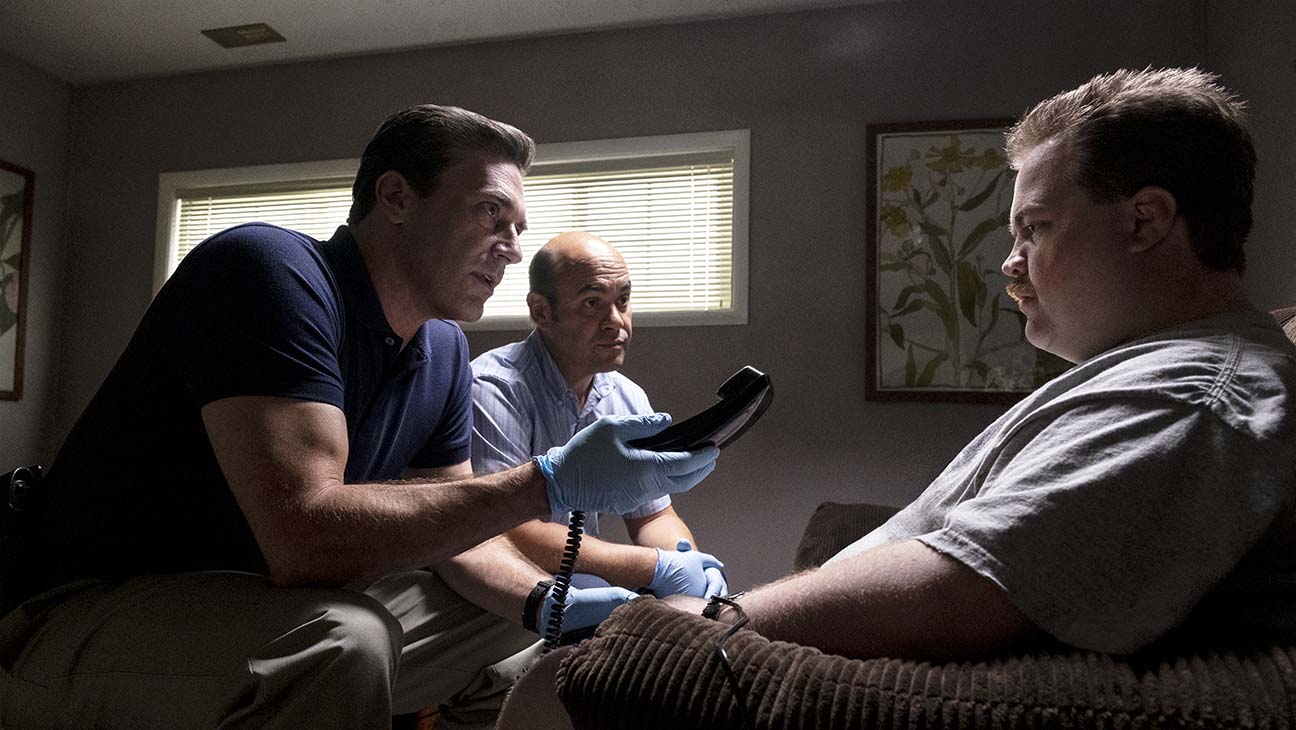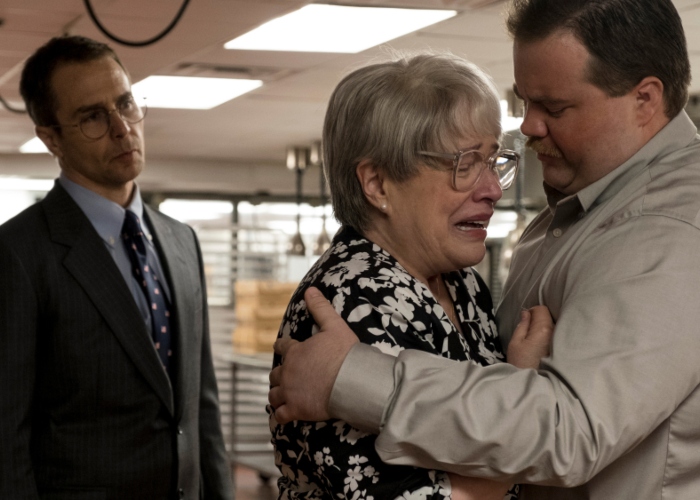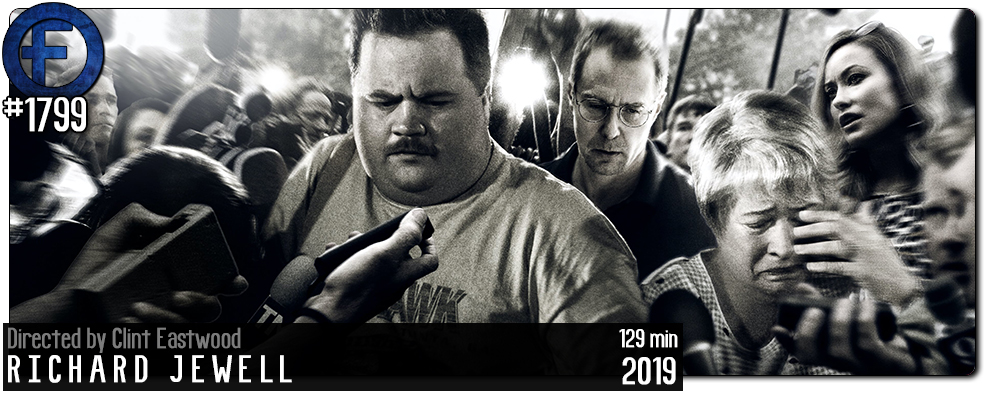Movie Review – Richard Jewell
Principal Cast : Paul Walter Hauser, Sam Rockwell, Kathy Bates, John Hamm, Olivia Wilde, Nina Ariana, Ian Gomez, Wayne Duvall, Dylan Kussman, Mike Pniewski, Eric Mendenhall.
Synopsis: American security guard Richard Jewell saves thousands of lives from an exploding bomb at the 1996 Olympics, but is vilified by journalists and the press who falsely reported that he was a terrorist.
********
Clint Eastwood’s directorial career has been considerably spotty the last decade, with bona fide gems (Gran Torino, American Sniper) amid a glut of fine-to-bad fare (The 15:17 To Paris was egregiously poor), and approaching the Hollywood icon’s latest venture, a biopic centred on Olympic bombing hero Richard Jewell, was an experience in trepidation. Thankfully, Eastwood knocks this out of the park, with his typically restrained, quiet style of filmmaking and character work, allowing the brooding sense of walls-closing-in legal thrills to manifest in a way that seems (and was) plausible. Richard Jewell is a film about “trial by media”, the insatiable desire of American journalism to get the story out and manufacture the narrative around much of what transpires in that country – heck, it happens in every country, let’s be honest – and the man at the center of it, despite passing away in 2007 from health complications, makes a captivating subject for Eastwood to tackle.

In Atlanta, Georgia, the 1996 Olympic Games were rocked by an explosion at the event’s most public space, Centennial Park, in which two people lost their lives and hundreds were injured. Richard Jewell (Paul Walter Hauser – I Tonya, Blakkklansman), a security guard working at a concert alongside police and Games security, is the first to spot an unattended backpack beneath a bench next to a light tower, and upon the bomb squad realising that it is, indeed, an explosive device, begin to move people out of the area. The bomb explodes before everyone can get to safety, leaving FBI Agent Tom Shaw (Jon Hamm) to investigate the case as a terrorist incident. Initially hailed as a hero, Jewell suddenly finds himself at the center of a full FBI investigation, with the case workers believing him to be an attention seeker wanting glory after planting the very bomb he discovered. With his name announced by Atlanta newspaper journalist Kathy Scruggs (Olivia Wilde), and his reputation tarnished by both print and television organisations, Jewell and his mother, Bobi (Kathy Bates) must lean on the services of affable lawyer Watson Bryant (Sam Rockwell) to prove his innocence.

Richard Jewell (spelled with two L’s) is quite a moving experience. It’s a film that will make you legitimately angry, that a man could be so pilloried and so wrongly accused as this, that his life was literally turned upside down when all he wanted to do was help people. Crucially, the films hangs entirely on its central performance by Paul Walter Hauser, and let me just state that it appals me the actor wasn’t in the hunt for an Academy Award for this film. Kathy Bates, who plays Jewell’s mother Bobi, was nominated for best Supporting Actress for her part and I admit I didn’t think she really deserved it – she’s good but not especially great – but how Hauser slipped past the Academy’s notice baffles me entirely. Jewell is a slow-witted, probably-on-the-spectrum individual who prides himself as a potential law enforcement official. He was fired from a small-town police force, lost a job as a security guard at a nearby university for excessive litigation of students, and struggled to hold down basic employment. He was, however, fascinated with the justice system, and it was the respect he gave to the men of the FBI that, according to Eastwood’s film, led to his near undoing.

If you’ve never heard the name Richard Jewell before it’s probably best you go into this film completely cold. The screenplay by Billy Ray (Volcano, State of Play, Gemini Man) deliberates on the effects the descent into madness Jewell must have felt himself to be, with the FBI initially lauding him a hero before changing tack to focus on him singularly, and it’s a towering piece of literary restraint. The writing is based on a Vanity Fair magazine article and a best-selling 2019 book, with Ray providing context moreso for Jewell than the FBI and painting him as a lovable simpleton in many respects. It’s an affecting piece of writing, based on the case’s many well substantiated facts, although notably the film’s depiction of late journalist Kathy Scruggs, who passed away in 2001 aged just 43 from a prescription drug overdose, using sex as a method of coaxing case knowledge from an FBI agent, has come in for some criticism. As with most of Eastwood’s recent films, he directs with his usual understated style, reliant on character rather than dramatic hyperbolic editing or camerawork to sell his story to the masses. Combined together, the screenplay, Eastwood’s direction and a terrific ensemble delivering roundly excellent performances, Richard Jewell is quite literally a jewel in the director’s storied latter works.

The emotional core of the film hangs with Hauser and Bates as innocent family involved in this affair, and they provide a deeply personal nexus for the supporting cast to work around. Sam Rockwell aces his laconic lawyer role, as you’d expect, Jon Hamm is menacing as the dogged FBI agent trying to prove Jewell did it, Nina Arianda is sweet as Rockwell’s law-firm personal assistant, and Ian Gomez is solid as Hamm’s FBI cohort. Of all the cast, however, who is treated poorly, you’d be surprised to learn it’s Olivia Wilde’s snarky reporter woman who comes in for the most egregious oversight here. A compelling character of determination and motivation overriding common sense and truth beyond facts, Wilde’s Scruggs was to me the yin to Jewell’s yang, although this contrast isn’t explored in a way I felt justified her inclusion. Scruggs is obviously the film’s secondary antagonist (behind Hamm’s composite FBI character), portrayed as a ball-busting, sexually satisfying career woman who stops at nothing to get the story, regardless of who she hurts in the meantime, but at no point for almost the entire length of the film do we get a sense of her motivation beyond simply being a total bitch. Her treatment of Jewell, and his subsequent suit against the paper she worked for, led for many to call out the American media landscape for turning Jewell into a pariah without actually hearing the full truth. Jewell, a complete innocent, is castigated in public by all who think they know the story, only to find after the fact that… well, he didn’t do it. In a scene late in the film, Scruggs is seen crying during a press-conference held by Bobi Jewell exhorting the press to leave her son alone, with the journalist having come to the realisation that Jewell has been falsely accused, and she is responsible. While I admire Eastwood for putting this sense of cathartic guilt into the movie, it felt like a footnote to the larger picture, and it disappointed me.

Despite this, Richard Jewell is a fascinating character piece that examines life inside the microscope of American character assassination. It’s an infuriatingly maddening look inside the shattering of an innocent man’s life by those he trusts to exonerate him, and how it affected both he and his mother. Jewell himself spent the rest of his life taking various media organisations to court for (among other things) libel, and his estate continued to do so after his early passing back in 2007. Eastwood’s direction is introspective and relaxed, the story itself as compelling as any biographical film of recent times, and the period production design, costuming, cinematography and sublime climactic character epiphany make for a brilliantly executed, effectively moving dramatic work. Highly regarded, and most certainly recommended.


